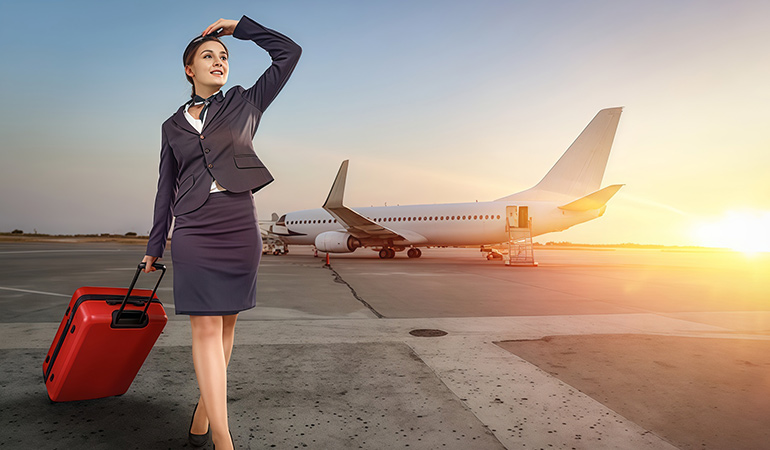Eligibility Requirements
Becoming a cabin crew member generally requires meeting certain basic criteria:
- Education: Most airlines require a 10+2 pass (any stream) or a bachelor’s degree. Good communication skills in English are also expected.
- Age: Candidates are usually between 18 and 27 years old. (Some airlines may allow slight variations.)
- Height & Fitness: Female candidates typically need a minimum height of about 155 cm, and males about 170 cm. Good vision and overall health (without serious medical issues) are mandatory.
- Appearance: Professional grooming and a pleasing personality are important. Airlines expect well-groomed crew with polished etiquette. Applicants must also pass background and medical checks.
Key Skills Required
Cabin crew need strong interpersonal skills and professional traits. Key skills include:
- Communication: Excellent spoken English (and often Hindi or other regional languages) is essential. Clear, friendly communication helps in announcements and passenger interactions.
- Grooming & Attitude: A neat, polished appearance and confident demeanor are crucial. Airlines train crew extensively in grooming, poise, and cultural etiquette.
- Customer Service: Patience, empathy, and a positive attitude are vital. Crew must address passenger needs courteously while remaining calm under pressure.
- Teamwork & Composure: Cabin crew work as a team. The ability to cooperate with pilots and colleagues and handle stressful or emergencies calmly is required.
These skills are developed during training so you can project a professional image and deliver top-notch in-flight service.
IGI’s Cabin Crew Training Program
IGI’s Cabin Crew / Air Hostess course in Mangalore is designed to be intensive and industry-focused. It runs for 3, 6, or 9 months and is open to 12th-pass or graduate students aged 18–27. The curriculum covers all critical areas of cabin service: in-flight work, safety procedures, emergency drills, and hospitality. Highlights of the program include:
- Duration & Eligibility: 3/6/9 month courses; open to 12th-pass/graduates aged 18–27.
- Hands-On Training: In-flight duties, safety moves, and emergency drills are taught through practical sessions. Mock flights and evacuation practice build real-world confidence.
- Grooming & Hospitality: Intensive grooming workshops, etiquette lessons, and communication development prepare you to meet airline standards.
- Expert Faculty: Classes are led by aviation professionals and former cabin crew. Their industry experience ensures you learn current airline expectations.
- Placement Support: IGI provides dedicated placement assistance. Graduates are guided toward cabin crew interviews and can also pursue roles in ground staff or hospitality.
This program equips you with the technical knowledge and soft skills airlines look for, so you can confidently clear cabin crew recruitment processes.
Starting Salary and Growth
Cabin crew salaries in India start modestly and grow with experience. Fresh entrants typically earn around ₹25,000–₹40,000 per month (about ₹3–5 lakhs per year). As you gain experience, pay increases: after a few years you might earn roughly ₹45,000–₹60,000 per month. Senior cabin crew or supervisory roles command even higher pay – often ₹70,000–₹100,000+ per month (₹8–12+ lakhs annually). For example, entry-level crew at major airlines earn around ₹37–38k/month, while with 5+ years they may earn ₹42–43k/month. In summary, a cabin crew career offers steady salary growth as you move from junior roles into leadership positions.
Airline-wise Salary Range in India
Salary scales can vary by airline. The approximate ranges (per month) at major Indian carriers are:
- IndiGo: Fresher ₹30,000–50,000; mid-level ₹50,000–60,000; senior ₹60,000+.
- Air India: Fresher ₹40,000–55,000; mid-level ₹55,000–65,000; senior ₹65,000–75,000+.
- SpiceJet: Fresher ₹28,000–45,000; mid-level ₹45,000–55,000; senior ₹55,000–70,000.
- Vistara: Fresher ₹35,000–45,000; mid-level ₹45,000–60,000; senior ₹60,000–70,000.
These figures are indicative ranges; actual pay can vary with experience, international routes, and allowances. Premium airlines (international carriers) typically pay even higher.
Perks and Career Growth
Cabin crew enjoy many non-salary benefits and clear career paths:
- Travel & Benefits: Crew get to travel widely as part of the job. Airlines often provide free or heavily discounted tickets for personal travel. Flight allowances, meal stipends, and hotel accommodations on layovers are usually covered.
- Health & Allowances: Comprehensive medical insurance (including hospitalization, dental, vision) is typically provided. Many airlines also offer life insurance and wellness programs. Some carriers even include pension schemes and retirement benefits.
- Work-Life Balance: Schedules are roster-based with regular off-days. For example, cabin crew often work 5–7 days on followed by 2–4 days off, averaging about 12–15 days off per month. This allows time for rest, personal commitments, and preparation between flights.
- Training & Growth: Airlines invest in ongoing training. Initial training (often 2–3 months) and periodic recurrent training keep skills sharp. There are clear promotion paths: experienced crew can advance to senior cabin crew, In-Flight Supervisors or Managers, and even trainer/instructor roles. Top performers often move into cabin crew management or recruitment within 8–10 years.
Overall, a cabin crew career not only offers travel and flexible hours but also steady professional development and attractive benefits.
Conclusion
A career as an air hostess or cabin crew member is an exciting journey with the Indian Group of Institutions. IGI’s comprehensive training and expert guidance prepare you for the in-demand skills airlines require. If you’re ready to Apply Now or want more information, contact IGI today – and download our cabin crew Career Guide to plan your future in aviation. Your adventure above the clouds starts here at IGI!




